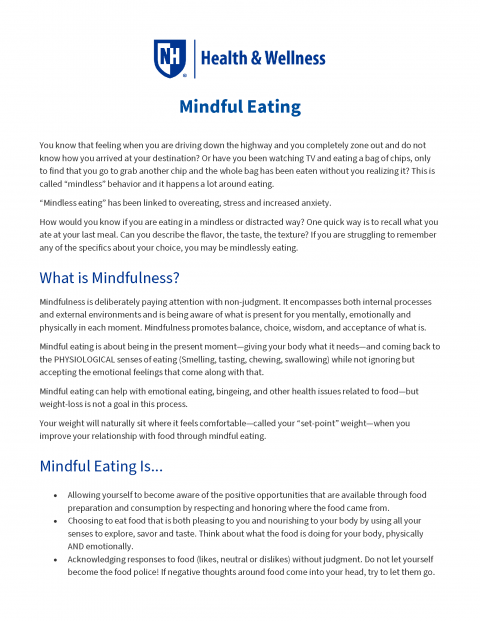Health & Wellness provides services and education to help you eat well and reach your goals.
To find events and programs related to nutrition, body positivity, eating concerns, and more, visit:
Events, Workshops, and Classes
Are you a student interested in nutrition that wants to get involved with Health & Wellness? Learn more:
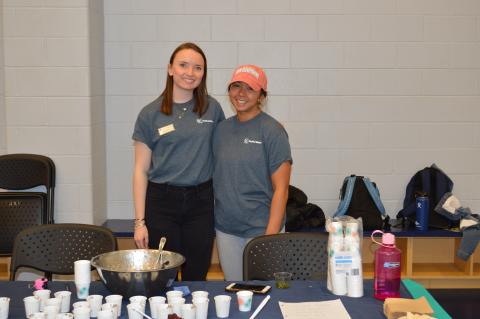
Medical Care
Our clinicians can evaluate, diagnose and provide medical care for individuals with nutrition and eating concerns. Make an appointment online or by calling (603) 862-2856.
Individual Counseling/Education
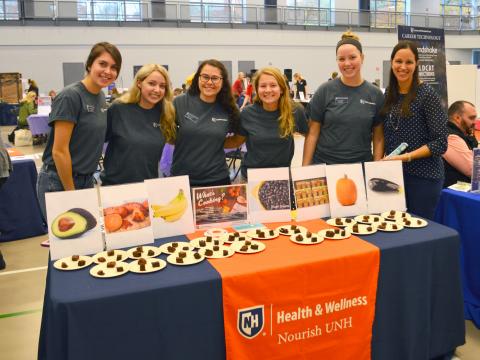
We offer individual sessions with registered dietitian, Laila Hammam, MS, RD, LD.
Reach out for nutrition education/counseling to receive assistance with:
- Eating well with limited time and money
- Navigating the dining halls
- Managing nutrition-related disease/health problems
- Refueling for optimal sports performance
- Managing weight and body image concerns
- Normalizing disordered eating behaviors
- Getting adequate nutrients for vegetarians/vegans
- Practicing mindful eating
Appointments
- All visits are confidential
- This service is available to all UNH students and is offered at no cost for full-time students who have paid their tuition/fees.
- Make an appointment online or by calling (603) 862-3823.
Campus Resources
Why should I eat well?
Eating well can support your academic and personal goals at UNH. A healthy, balanced diet helps you by:
- improving energy levels, concentration, memory and mood
- increasing your ability to cope with stress
- enhancing your overall physical health
- boosting your immune system and protecting against certain diseases

How can I eat well?
Eating well doesn’t need to be difficult. Using the Wildcat Plate, you can easily balance your meals with foods you enjoy. The Wildcat Plate is a useful tool, based on the USDA MyPlate (Links to an external site.) model, which emphasizes and helps to visualize the right balance of vegetables, fruits, whole grains, low-fat dairy, and lean protein foods. As the plate shows, it is important to focus on eating a variety of foods. It is also important to remember that all foods fit, and that there are no “bad” foods. Aim to fill half your plate with fruits and vegetables, ¼ of your plate with lean proteins, and ¼ of your plate with whole grains and to include some dairy or dairy alternative.
What about dieting?
We often hear about fad diets in pop culture and all over social media. Everyone seems to have a different opinion on what will work to get you that "perfect body," and there are often confusing messages on what you should or should not eat. The reality is, the perfect body does not exist, and these diets typically don't work or only "work" for a short time. They can even be hazardous to your health.
Dieting is a common practice among young people and is increasing in all genders. Studies have shown that 60-80% of young students have been on a diet in the previous year. Dieting can contribute to poor mental as well as physical health which can make college life very difficult. This is an important time to make healthy lifestyle changes that you can carry with you after college.
The Non-Diet Approach
The non-diet approach to managing weight is an attuned and mindful-based eating approach that supports self-esteem and body acceptance. It replicates a normalized style of eating which prevents the development of disordered eating and eating disorders.
The Health at Every Size (HAES) approach supports the non-diet approach and its focus on self-acceptance. HAES is based on the simple premise that the best way to improve health is to honor your body. It supports people in adopting health habits for the sake of health and well-being, rather than weight control.
The best diet is the non-diet. Avoid focusing on calories, grams of key nutrients (like carbohydrates, protein and fat), or specific food groups.
Instead:
- Enjoy a variety of foods. All food can fit into your food plan with the right balance! There is no such thing as "good" and "bad" foods.
- Learn to listen to signals of hunger, thirst and fullness.
- Eat small meals throughout the day to keep yourself energized and to avoid extremes of hunger.
- Stay hydrated to feel good and perform well. Thirst is often mistaken for hunger and/or fatigue.
Learn More
When the Fall 2020 semester went virtual, we started releasing recipes that are easy to make and budget-friendly in place of our typical, in-person What's Cooking? Cooking Classes.
This Spring, we're continuing the tradition.
Find the Fall 2020 Recipes here.
Did you make a recipe that you loved? Tag us on Instagram @UNHHealth with #whatscookingwildcats!
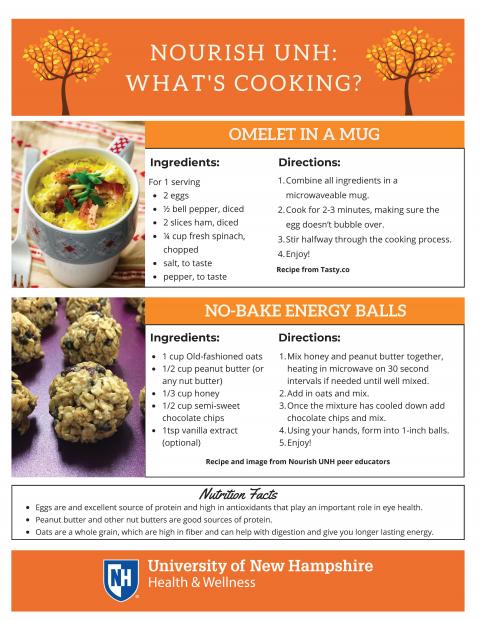
March 4, 2021
Omelet-in-a-Mug
No-Bake Energy Balls

March 11, 2021
Stuffed Sweet Potato
Simple Strawberry Smoothie
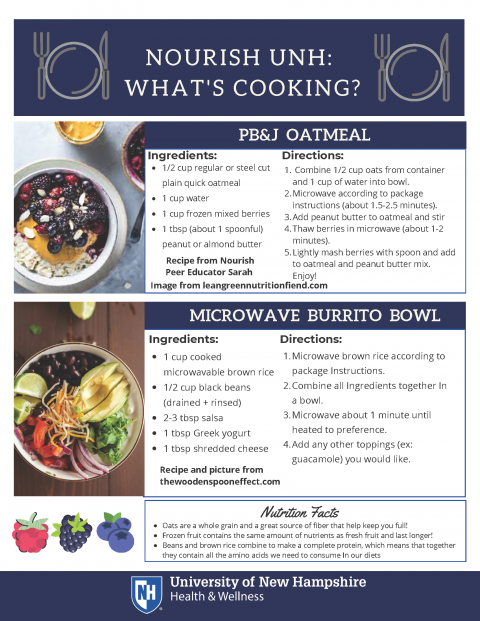
March 18, 2021
PB&J Oatmeal
Burrito Bowl
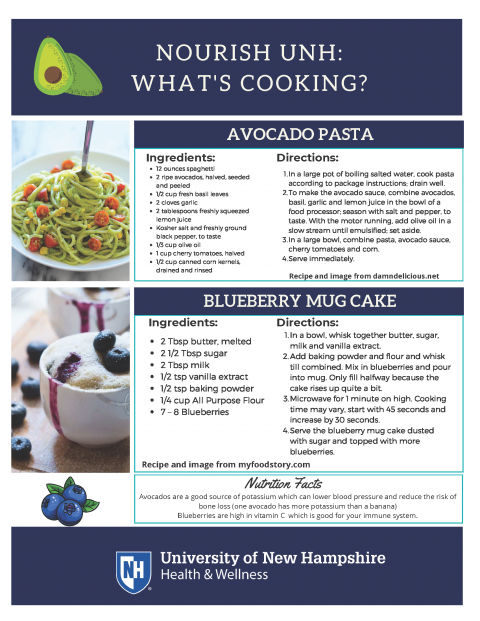
March 25, 2021
Avocado Pasta
Blueberry Mug Cake
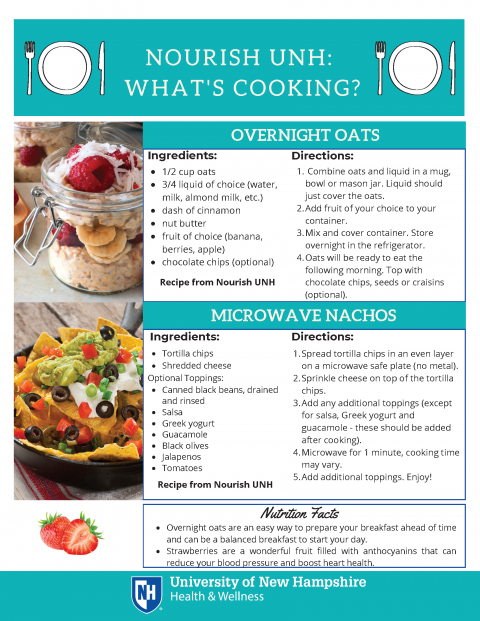
April 1, 2021
Overnight Oats
Microwave Nachos

April 15, 2021
Orzo Salad
Yogurt Popsicles
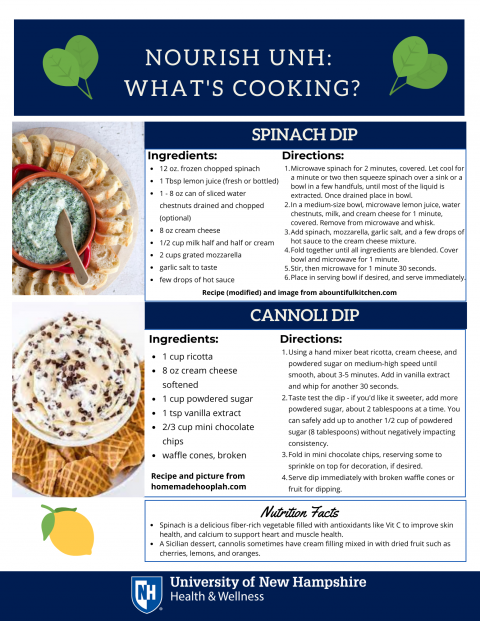
April 22, 2021
Spinach Dip
Cannoli Dip
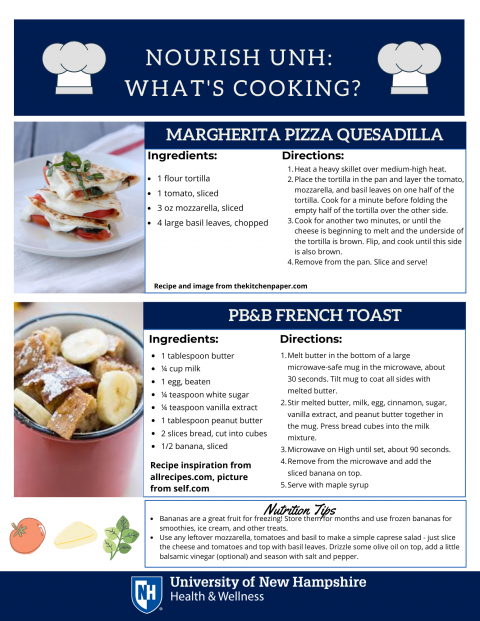
April 29, 2021
Margherita Pizza Quesadilla
PB&B French Toast
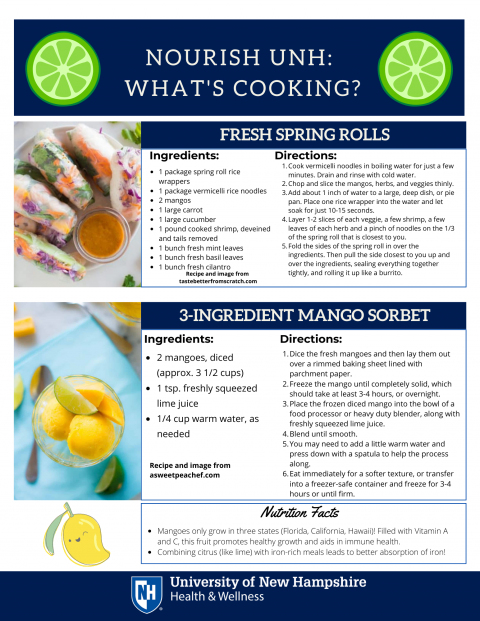
May 6, 2021
Fresh Spring Rolls
Mango Sorbet
